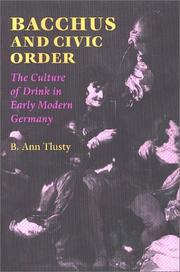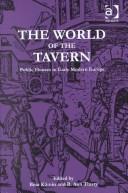| Listing 1 - 8 of 8 |
Sort by
|

ISBN: 0813920442 0813920450 0813921708 9780813921709 9780813920450 9780813920443 1280490012 9786613585240 Year: 2001 Publisher: Charlottesville (Va.): University press of Virginia,
Abstract | Keywords | Export | Availability | Bookmark
 Loading...
Loading...Choose an application
- Reference Manager
- EndNote
- RefWorks (Direct export to RefWorks)
Lining the streets inside the city's gates, clustered in its center, and thinly scattered among its back quarters were Augsburg's taverns and drinking rooms. These institutions ranged from the poorly lit rooms of backstreet wine sellers to the elaborate marble halls frequented by society's most privileged members. Urban drinking rooms provided more than food, drink, and lodging for their guests. They also conferred upon their visitors a sense of social identity commensurate with their status. Like all German cities, Augsburg during the sixteenth and seventeenth centuries had a history shaped by the political events attending the Reformation, the post-Reformation, and the Thirty Years' War; its social and political character was also reflected and supported by its public and private drinking rooms. In Bacchus and Civic Order: The Culture of Drink in Early Modern Germany, Ann Tlusty examines the social and cultural functions served by drinking and tavern life in Germany between 1500 and 1700, and challenges existing theories about urban identity, sociability, and power. Through her reconstruction of the social history of Augsburg, from beggars to council members, Tlusty also sheds light on such diverse topics as social ritual, gender and household relations, medical practice, and the concerns of civic leaders with public health and poverty. Drunkenness, dueling, and other forms of tavern comportment that may appear "disorderly" to us today turn out to be the inevitable, even desirable result of a society functioning according to its own rules.
Drinking customs --- Drinking of alcoholic beverages --- Taverns (Inns) --- History. --- Social aspects. --- Augsburg (Germany) --- Social life and customs. --- History of Germany and Austria --- History of civilization --- anno 1600-1699 --- anno 1500-1599 --- Augsburg --- Hotels, taverns, etc. --- Inns --- Hospitality industry --- Hotels --- Manners and customs --- Alcohol consumption --- Alcohol drinking --- Alcohol use --- Alcoholic beverage consumption --- Consumption of alcoholic beverages --- Drinking problem --- Liquor problem --- Social drinking --- Alcoholic beverages --- Alcoholism --- Temperance --- Augusta Vindelicorum (Germany) --- Augusta (Germany) --- Augusta Civitas (Germany) --- Augusta Retia (Germany) --- Augusta Swevie Civitas (Germany) --- Augusta Vindelica (Germany) --- Augusta Vindelicensis (Germany) --- Auhsburh (Germany) --- Augustana Civitas (Germany) --- Augustanus (Germany) --- Augustensa (Germany) --- Augustum (Germany) --- Colonia Augusta Raetorum (Germany) --- Licautiorum Damasia (Germany) --- Reciae Civitas (Germany) --- Recie Provincie Metropolis (Germany) --- Swevie Metropolis (Germany) --- Tragopolis (Germany) --- Vindelica (Germany) --- Vindelica Aelia Augusta (Germany) --- Vindelicensis Augusta (Germany) --- Pfersee (Germany) --- Social aspects --- History --- E-books --- Drinking customs - Germany - Augsburg - History. --- Drinking of alcoholic beverages - Germany - Augsburg - Social aspects. --- Taverns (Inns) - Germany - Augsburg - History.
Book
ISBN: 9781472569783 9781350199613 9781350199620 1350199621 Year: 2021 Publisher: London Bloomsbury Academic
Abstract | Keywords | Export | Availability | Bookmark
 Loading...
Loading...Choose an application
- Reference Manager
- EndNote
- RefWorks (Direct export to RefWorks)
This book examines how the profound religious, political, and intellectual shifts that characterize the early modern period in Europe are inextricably linked to cultural uses of alcohol in Europe and the Atlantic world. Combining recent work on the history of drink with innovative new research, the eight contributing scholars explore themes such as identity, consumerism, gender, politics, colonialism, religion, state-building, and more through the revealing lens of the pervasive drinking cultures of early modern peoples. Alcohol had a place at nearly every European table and a role in much of early modern experience, from building personal bonds via social and ritual drinking to fueling economies at both micro and macro levels. At the same time, drinking was also at the root of a host of personal tragedies, including domestic violence in the home and human trafficking across the Atlantic. Alcohol in the Early Modern World provides a fascinating re-examination of pre-modern beliefs about and experiences with intoxicating beverages.
Alcoholic beverage industry --- Alcoholic beverages --- Drinking of alcoholic beverages --- Social aspects --- History. --- Biotechnology --- History of civilization --- drinks --- alcohol [general] --- anno 1500-1799

ISBN: 0754603415 9780754603412 9781315236513 9781351880268 Year: 2002 Publisher: Aldershot: Ashgate,
Abstract | Keywords | Export | Availability | Bookmark
 Loading...
Loading...Choose an application
- Reference Manager
- EndNote
- RefWorks (Direct export to RefWorks)
History of civilization --- History of Europe --- anno 1500-1799 --- anno 1800-1999 --- Bars (Drinking establishments) --- History --- #A0511HI --- History. --- Ale-houses --- Cafés --- Dive bars (Drinking establishments) --- Dives (Drinking establishments) --- Dramshops --- Drinking establishments --- Hotels, taverns, etc. --- Public houses --- Pubs --- Saloons --- Shebeens --- Taverns (Drinking establishments) --- Hospitality industry --- Happy hours --- Bars (Drinking establishments) - Europe - History
Book
ISBN: 9789004416055 9789004414952 9004416056 9004414959 Year: 2020 Publisher: Leiden Brill
Abstract | Keywords | Export | Availability | Bookmark
 Loading...
Loading...Choose an application
- Reference Manager
- EndNote
- RefWorks (Direct export to RefWorks)
"A Companion to Late Medieval and Early Modern Augsburg introduces readers to major political, social and economic developments in Augsburg from c. 1400 to c. 1800 as well as to those themes of social and cultural history that have made research on this imperial city especially fruitful and stimulating. The volume comprises contributions by an international team of 23 scholars, providing a range of the most significant scholarly approaches to Augsburg's past from a variety of perspectives, disciplines, and methodologies. Building on the impressive number of recent innovative studies on this large and prosperous early modern city, the contributions distill the extraordinary range and creativity of recent scholarship on Augsburg into a handbook format. Contributors are Victoria Bartels, Katy Bond, Christopher W. Close, Allyson Creasman, Regina Dauser, Dietrich Erben, Alexander J. Fisher, Andreas Flurschütz da Cruz, Helmut Graser, Mark Häberlein, Michele Zelinsky Hanson, Peter Kreutz, Hans-Jörg Künast, Margaret Lewis, Andrew Morrall, Marjorie Elizabeth Plummer, Barbara Rajkay, Reinhold Reith, Gregor Rohmann, Claudia Stein, B. Ann Tlusty, Sabine Ullmann, Wolfgang E.J. Weber.".
History of Germany and Austria
---
anno 1400-1499
---
anno 1500-1599
---
anno 1600-1699
---
anno 1700-1799
---
Augsburg
---
094.1 <43 AUGSBURG>
---
943.02
---
943.02 Geschiedenis van Duitsland: verdrag van Verdun tot de Reformatie--(843-1519)
---
Geschiedenis van Duitsland: verdrag van Verdun tot de Reformatie--(843-1519)
---
094.1 <43 AUGSBURG> Oude drukken: bibliografie--
Book

ISBN: 9780271091112 Year: 2021 Publisher: University Park, PA
Abstract | Keywords | Export | Availability | Bookmark
 Loading...
Loading...Choose an application
- Reference Manager
- EndNote
- RefWorks (Direct export to RefWorks)
Digital

ISBN: 9780271091112 Year: 2021 Publisher: University Park, Pa Penn State University Press
Abstract | Keywords | Export | Availability | Bookmark
 Loading...
Loading...Choose an application
- Reference Manager
- EndNote
- RefWorks (Direct export to RefWorks)
Digital

ISBN: 9783050073576 9783050030968 Year: 2018 Publisher: Berlin Akademie Verlag
Abstract | Keywords | Export | Availability | Bookmark
 Loading...
Loading...Choose an application
- Reference Manager
- EndNote
- RefWorks (Direct export to RefWorks)
Book

ISBN: 2847885366 2847884033 Year: 2018 Publisher: Lyon : ENS Éditions,
Abstract | Keywords | Export | Availability | Bookmark
 Loading...
Loading...Choose an application
- Reference Manager
- EndNote
- RefWorks (Direct export to RefWorks)
On ne naît pas homme, on le devient. Cet ouvrage se propose de déconstruire ce qui a fait longtemps figure d'invariant et de montrer que la masculinité a une histoire. Les contributions, qui courent de la préhistoire à nos jours, peignent ainsi des masculinités à la fois multiples et changeantes. Ce livre examine en premier lieu les signes et marqueurs de la masculinité qui permettent d'emblée de savoir qui est un homme. Il analyse ensuite les preuves et épreuves de masculinité, qu'elles soient professionnelles, sexuelles ou militaires. Les hommes, en effet, se doivent de démontrer, toute leur vie durant, qu'ils remplissent bien les critères de « bonne masculinité » attendus d'eux. Sont en jeu ici les processus sociaux et éducatifs qui transforment le sexe en genre et la nature en culture. Ces preuves et épreuves non seulement font « l'homme » mais construisent également les hiérarchies masculines, opposant dominants et dominés, gagnants et perdants de la masculinité. Une histoire des hommes et des masculinités fondée sur le genre permet ainsi de mieux comprendre la résistance de la domination masculine et les inégalités présentes entre hommes et femmes.
Women's Studies --- masculinité --- virilité --- représentations sociales --- homme --- histoire --- identité sexuelle --- histoire du corps
| Listing 1 - 8 of 8 |
Sort by
|

 Search
Search Feedback
Feedback About UniCat
About UniCat  Help
Help News
News